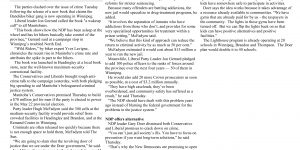The most important research paper is published in the Journal of Politics. https://www.journals.uchicago.edu/doi/full/10.1086/702947
As studies using macrolevel evidence have shown, citizens are more satisfied with democracy when they feel that their instrumental preferences are represented in government, and this feeling is more likely in nonmajoritarian institutional contexts. Scholars have given less attention to whether such institutions also increase satisfaction by providing more inclusive political discourse. Citizens may value having their voice represented in politics, regardless of the resulting authority. This article presents the first microlevel evidence of this mechanism by having subjects experience a simulated election campaign that manipulates both the political discourse and the outcome independently. We find that subjects were less satisfied with democracy when their party lost the election, but this effect disappeared when the campaign discourse featured thorough discussion of an issue that they felt was important. The findings suggest that institutions and party systems that provide more diverse voices may soften the blow of losing elections.

Learning Significance